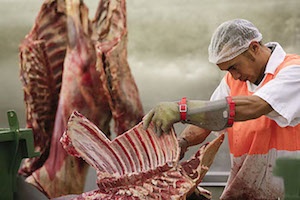US: USMEF Discusses Farm Bill and Importance of US-Mexico Trade Relations

Peterson, who led the drafting of four farm bills in his 30 years in Congress, said trade too often takes a backseat to the debate and messaging about farm bills.
“I used to meet with my colleagues who came to discuss the bill on farms. They talked about crop insurance , conservation and rural development. And at the end of the meeting, they said: “Oh, by the way, we have to do something about trade.” This should be the first thing you talk about, not the last,” Peterson said.
Peterson said the current farm bill expires September 30. But he noted that if job requirements for those receiving nutrition assistance are included in negotiations to raise the debt ceiling, it could help speed up debate on the farm bill.
Peterson also stressed the importance of animal health and disease prevention programs for foreign animals, as disease outbreaks can be devastating to trade.
"This is one of the most important issues we need to focus on," he said.
USMEF members received an update on U.S. -Mexico trade relations from Kenneth Smith Ramos, former chief NAFTA negotiator for Mexico, who played a key role in the development and ratification of the U.S.-Mexico-Canada Agreement (USMCA). Now Smith, an international trade consultant, has detailed the critical importance of these trade relationships for the agricultural sectors of both countries.
“When the initial NAFTA agreement was being negotiated, there was a lot of nervousness, especially in Mexico, about the full reopening of agricultural trade,” he said. “But right now, more than half of what we export to the United States is fruits and vegetables that we can grow year-round and meet demand in the United States. Mexico imports grains, oilseeds, and meat products from the US, capitalizing on the comparative and competitive advantages of both countries, and this has helped boost overall agricultural trade over the years.”
Smith noted that while American meat products already had duty-free access to Mexico under NAFTA, the development and adoption of the USMCA did more than just maintain the status quo.
“We have been able to modernize the agreement with 12 new chapters that include disciplines that did not exist in 1992 or that needed to be adapted to today's needs and the global economy,” he said. — For example, in the sanitary and phytosanitary chapter, there is more emphasis on transparency and evidence-based risk assessment. We were also able to exclude proposals aimed at managing trade.”
Smith said that while agricultural goods usually move freely between the US and Mexico, the US meat industry needs to be mindful of contentious issues - both agricultural and non-agricultural - that can disrupt trade. He also encouraged USMEF members to spread the word about the critical role of free trade in promoting food security in the region.
"We need to put food security at the top of the agenda so that our governments - especially in the case of the Mexican government - understand that this is not just a 'request' from private sector companies that want to make a lot of money." he explained. “Of course, this is business and we want trade to create economic opportunity. But governments also need to understand that international trade – barrier-free trade – is how we are going to improve food security in the future.”



























































